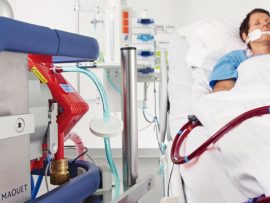Abstract Background Clinical evidence regarding predictors of successful weaning from mechanical circulatory support (MCS) is lacking. This study aimed to create a simple risk score to predict successful weaning from..
WeiterlesenAbstract As extracorporeal cardiopulmonary resuscitation (ECPR) is increasingly utilized for refractory cardiac arrest in adults, we learn significantly more about resuscitation in ways that were not applicable, or even available..
WeiterlesenAbstract Introduction: Extracorporeal cardiopulmonary resuscitation (eCPR) has demonstrated patient outcome-driven benefits for those with out-of-hospital cardiac arrest in refractory ventricular fibrillation/pulseless ventricular tachycardia but remains an infrequent procedure requiring hands-on training...
WeiterlesenAbstract Extracorporeal cardiopulmonary resuscitation (ECPR) is a time-critical, resource-intensive intervention used in select cases of refractory cardiac arrest. Its success depends on rapid initiation, streamlined workflows, and coordination across multidisciplinary..
WeiterlesenAbstract The aim of this study was to develop a scoring tool to estimate the probability of survival following extracorporeal rewarming in patients suffering hypothermic cardiac arrest. This is a..
WeiterlesenAbstract When conventional cardiopulmonary resuscitation (CCPR) cannot restore spontaneous circulation, the initiation of venoarterial extracorporeal membrane oxygenation during refractory cardiac arrest—known as extracorporeal CPR (ECPR)—might restore circulation and adequate tissue..
WeiterlesenAbstract Background Survival from refractory out of hospital cardiac arrest (OHCA) treated with conventional cardiopulmonary resuscitation (CCPR) remains low. Extracorporeal cardiac resuscitation (ECPR) is increasingly be utilised in refractory OHCA,..
WeiterlesenAbstract Background ECPR patients who receive guideline-compliant CPR will have improved survival to hospital discharge (SHD) compared to patients who do not receive guideline-compliant CPR, regardless of CPR duration. Methods..
WeiterlesenAbstract Background There are limited data on the causes of death in patients undergoing extracorporeal cardiopulmonary resuscitation (ECPR). This study aimed to analyse the causes of death among patients who..
WeiterlesenAbstract Aim Prehospital extracorporeal cardiopulmonary resuscitation (ECPR) has been proposed to reduce delays in ECPR delivery in refractory out-of-hospital cardiac arrests (OHCA) and improve outcomes. Our aim was to synthesize..
WeiterlesenAbstract Objective Extracorporeal cardiopulmonary resuscitation (ECPR) is increasingly used to rescue patients in cardiac arrest. However, minimal data guide candidacy decisions, and centers must develop their own initiation criteria, raising..
WeiterlesenAbstract Extracorporeal cardiopulmonary resuscitation (ECPR) requires advanced skills for induction and management. This study evaluated whether the outcomes of ECPR differ by institutional volume. Using the Japanese Association for Acute..
WeiterlesenAbstract Introduction Venoarterial extracorporeal membrane oxygenation (VA-ECMO) is an essential life-support system in critical care specifically engineered to assist cardiac and respiratory function by externally maintaining blood perfusion and oxygenation..
WeiterlesenAbstract Background/Objectives: Conventional cardiopulmonary resuscitation (CCPR) has been the foundational resuscitation approach for decades. Where CCPR is unsuccessful, extracorporeal membrane oxygenation-assisted CPR (ECPR) may improve outcomes. Predicting failure of CCPR..
WeiterlesenAbstract Managing acute brain injury involves protecting the brain from secondary injury by addressing the mismatch between metabolic demand and cerebral perfusion. Observational studies have associated impaired cerebral autoregulation, a..
WeiterlesenAbstract Brain injury and cerebral inflammation are frequent complications following cardiopulmonary bypass (CPB) resulting in neurocognitive dysfunction, encephalopathy, or stroke. We compared cerebral inflammation induced by del Nido and histidine-tryptophan-α-ketoglutarate..
WeiterlesenAbstract Background: del Nido cardioplegia (dNC) solution is widely used in pediatric and congenital cardiac surgery. In 2014, Cincinnati Children’s Hospital Medical Center (CCHMC) changed from Mee cardioplegic solution to..
WeiterlesenAbstract OBJECTIVES Extracorporeal membrane oxygenation (ECMO) can act as a bridge to recovery in both pre- and postoperative patients with transposition of the great arteries (TGA). However, literature on its..
WeiterlesenAbstract Cardioplegic arrest and cardiopulmonary bypass (CP/CPB) are known to engender microvascular dysfunction in patients undergoing cardiac surgery. These effects are significantly varied by patient comorbidities including diabetes and hypertension...
WeiterlesenAbstract Rapid hemodynamic stabilization and restoration of pulmonary perfusion are the cornerstones of treatment for high-risk pulmonary embolism (PE). While all current guidelines recommend systemic thrombolysis (SYS) as the first-line..
WeiterlesenAbstract Background The optimal pulmonary revascularisation strategy in high-risk pulmonary embolism (PE) requiring implantation of extracorporeal membrane oxygenation (ECMO) remains controversial. Methods We conducted a systematic review and meta-analysis of..
WeiterlesenAbstract Aim To compare the long-term Health-Related Quality of Life (HRQoL) between patients receiving extracorporeal cardiopulmonary resuscitation (ECPR) and conventional cardiopulmonary resuscitation (CCPR) for out-of-hospital cardiac arrest (OHCA). Methods and..
WeiterlesenAbstract The use of venoarterial extracorporeal membrane oxygenation (VA-ECMO) for temporary mechanical circulatory support in various clinical scenarios has been increasing consistently, despite the lack of sufficient evidence regarding its..
WeiterlesenAbstract Background Current adult cardiac surgery guidelines recommend against the routine use of prophylactic intravenous corticosteroids during cardiopulmonary bypass (CPB) due to concerns about myocardial injury, despite their potential to..
WeiterlesenAbstract Introduction Contemporary rates of survival after pediatric in-hospital CPR events and trends in survival over the last 20 years have not been compared based on illness category. We hypothesized that..
WeiterlesenAbstract The increased accessibility of extracorporeal membrane oxygenation following the COVID‐19 pandemic and the publication of the first randomized trial of extracorporeal cardiopulmonary resuscitation (ECPR) prompted the National Heart, Lung,..
WeiterlesenAbstract Objectives Patents with out-of-hospital cardiac arrest (OHCA) are at high risk of death or poor neurologic recovery if spontaneous circulation is not rapidly restored. Emergent mechanical circulatory support with..
WeiterlesenAbstract OBJECTIVES Extracorporeal membrane oxygenation (ECMO) can act as a bridge to recovery in both pre- and postoperative patients with transposition of the great arteries (TGA). However, literature on its..
WeiterlesenAbstract Venovenous (VV) extracorporeal membrane oxygenation (ECMO) supports end-organ oxygen delivery in patients with refractory respiratory failure. Physical therapy (PT) while on ECMO provides conceptual benefits of strength and conditioning...
WeiterlesenAbstract The mechanical circulatory support (MCS) for pediatric patients with severe acute heart failure and poor pulmonary conditions is challenging. Herein, we report the first pediatric case of successfully treated..
Weiterlesen



















